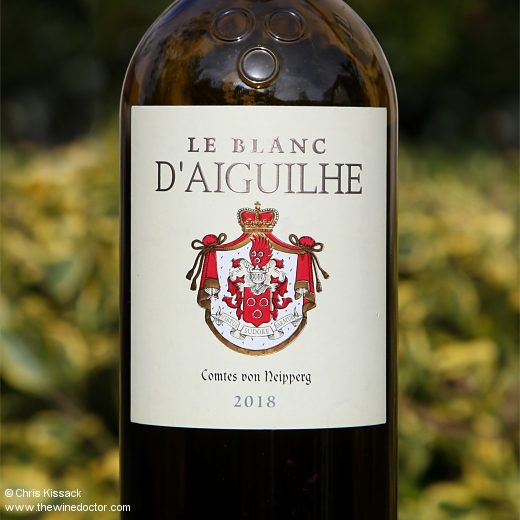Le Blanc d’Aiguilhe Bordeaux 2018
Having confessed (again) my love of the white wines of Bordeaux in last week’s 2021 Appellation Bordeaux report, I thought I should continue the theme with my latest Weekend Wine. Of course, this is not a new idea; I have been sporadically (and rather randomly) exploring Bordeaux whites through my weekend wine slot for some time. My most recent foray into this world was the 2020 Les Robins from Château Haut L’Abeille, a hidden gem made in the badlands out beyond Fronsac (‘badlands’ is possibly an exaggeration, but you know what I mean).
This latest example is from a domaine which is rather better known. Château d’Aiguilhe is part of the Neipperg portfolio, a rather smart collection of domaines which includes not one but two highly ranked St Emilion properties, Château Canon-la-Gaffelière and La Mondotte, among others. Like Château Haut L’Abeille, Château d’Aiguilhe is another more peripheral right-bank property; it is located in Saint-Philippe-d’Aiguilhe, to the east of Puisseguin and Montagne (the St Emilion satellites) in the Castillon Côtes de Bordeaux appellation.
Quite a few years have passed since I last visited Château d’Aiguilhe. Once a fortified farm, the first stone laid during the 13th century, the property sat on the frontier between the French and English territories during the Hundred Years’ War; I recall being impressed by its ancient ruins and the sense of history that seemed to hang in the air. It also feels insulated from the vinous monoculture that characterises much of Bordeaux, the estate’s vineyards seemingly competing for space with swathes of ancient forest. Having said all that, there is an extensive and clearly well-maintained vineyard, not to mention a modern winery, complete with all the glistening stainless steel equipment you would expect to find, as well a rather smartly presented tasting room.

Coming back to the vineyards, these are planted on rather thin soils of clay, degraded limestone and silt, which lies over a deep bed of cold limestone. There are 90 hectares of vines here, the vast majority of which are Merlot, partnered with Cabernet Franc. Quite sensibly though, Stephan von Neipperg recognised the region’s potential for white vines, and so a little over ten years ago he made the decision to plant a small area of Sauvignon Blanc. He had just 0.35 hectares to start with, but it was enough to produce the first vintage of Le Blanc d’Aiguilhe, in 2015. The project was evidently a success, as by the 2019 vintage he had 1.5 hectares planted, still purely Sauvignon, a figure which rose to 2.1 hectares the following year.
The 2018 vintage was picked on September 13th and 14th, not a particularly early harvest (2019 was later, but 2020 and – curiously – even 2021 were picked earlier). The winemaking was fairly straightforward, with pneumatic pressing and then fermentation of the juice in a stainless steel cuves. The élevage was mostly conducted in same, although 20% of the total was aged in oak barrels for six months. These were mostly older used barrels, with just 7% new oak in the mix. It was then bottled in May the year after the harvest.
I have to confess I came to the this wine with a faint sense of trepidation. A year or two has passed since I tasted it after bottling, and my memory of how it tasted at that time has long faded. What I do recall is that 2018 was a warm vintage which produced a slew of rich, textured, tannin-framed reds, while many of the whites – tasted at the primeurs, and after the bottling – for my palate lacked a little freshness, the acid levels a tad lower than I prefer. So I was taken aback by the sense of freshness and drive I found here.
In the glass the 2018 Le Blanc d’Aiguilhe from Château d’Aiguilhe displays a straw-coloured hue, with just a bare tinge of green around the rim. The aromatics are dominated by notes of yellow capsicum, crushed rock, mirabelle, melon, all very enticing, and the more biting Sauvignon notes of pine needle I spotted when I tasted this from barrel have faded. The palate is a real charmer, with a seductively textured poise, rather polished and velvety, perhaps the character of the vintage shining through, confirmed by the rather modest levels of acidity it possesses. Happily, though, there is structure here, coming from delightful parallel veins of bitterness and phenolic grip which give it a sense of frame, supporting the seams of melon, mirabelle and orange peel. It finishes with a bitter and velvet-painted length. From such a warm vintage, while the acidity is on the quieter side, this works really well, and turned out to be a joy to drink. The alcohol on the label is 13%. 91/100 (18/3/24)
Read more in:
- My profile of Château d’Aiguilhe
- My primeur reports on the Bordeaux 2018 vintage
- My guide to the Bordeaux wine region
